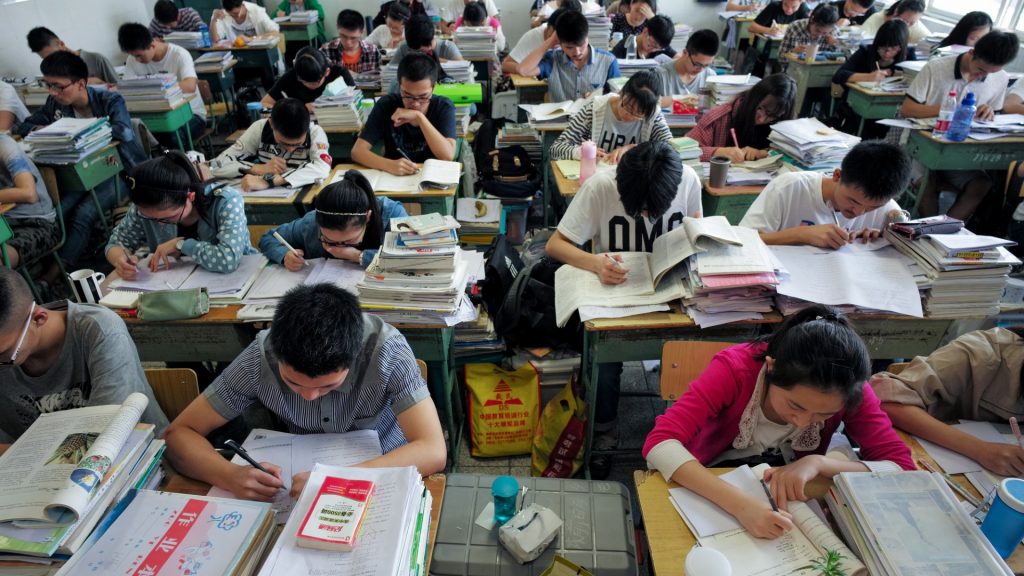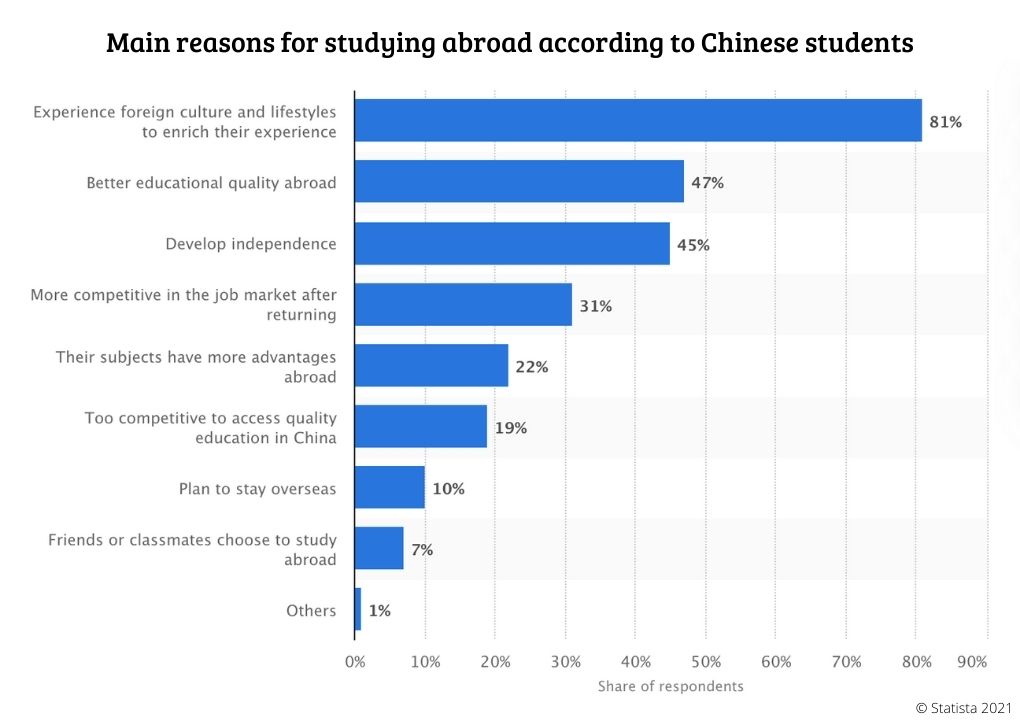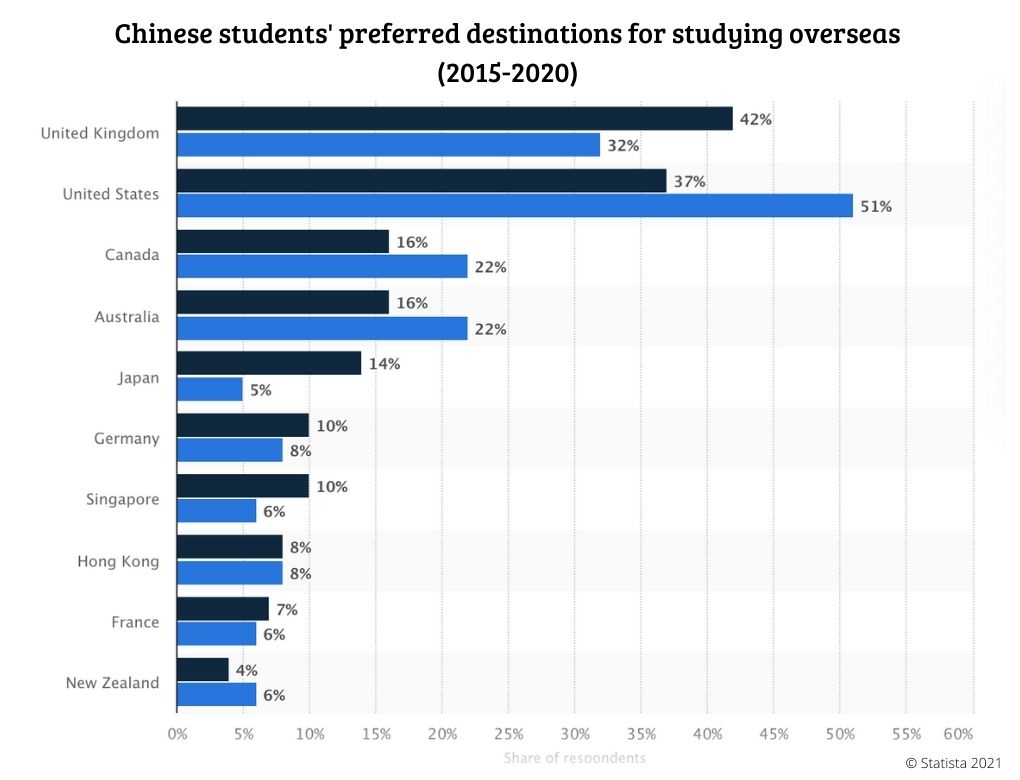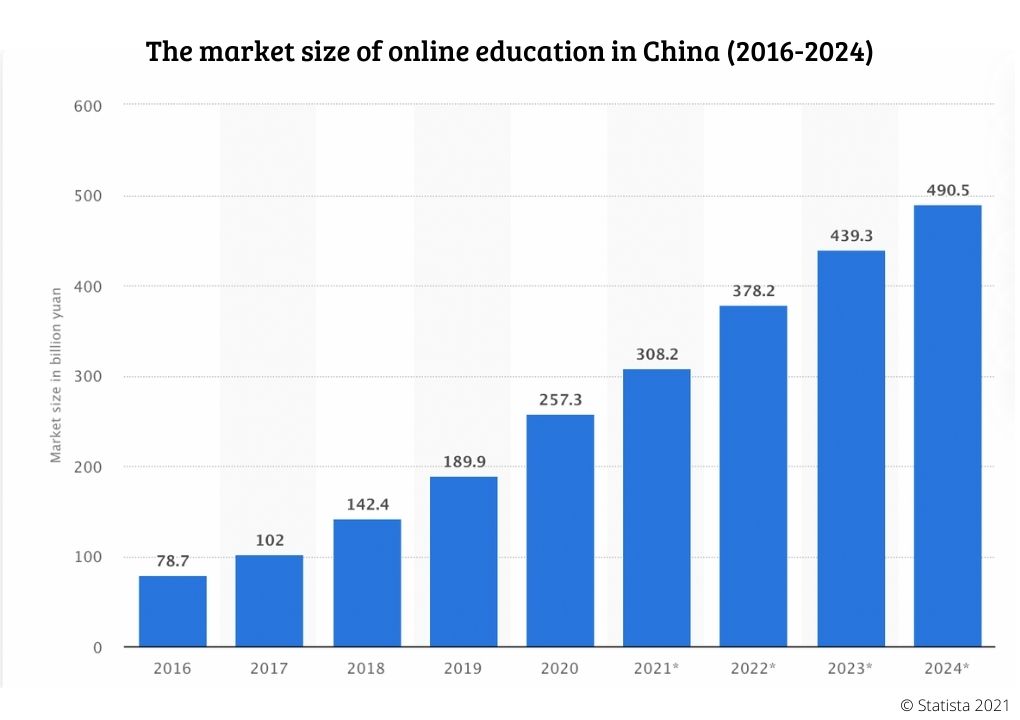How to attract Chinese students to your university?

In 2023 Chinese students are on the starting block and eager to go back abroad to study after 3 years being almost impossible to travel because of the harsh covid restrictions.
China has the world’s largest population (more than 1.4 billion people), so it is no surprise that one-third of all international students are Chinese. But with China’s strict visa requirements and high fees for studying abroad, why are they still coming? There are a few reasons, one being the demand being way higher than the offer in terms of education in China, as well as the promise of great career opportunities that offer a degree from a reputable overseas school.
Cost-Effective Agency
KPI and Results focused. We are the most visible Marketing Agency for China. Not because of huge spending but because of our SMART Strategies. Let us help you with: E-Commerce, Search Engine Optimization, Advertising, Weibo, WeChat, WeChat Store & PR.
In this post, you’ll learn top tips and tricks on how to make a good impression in order to get more applicants coming through your doors. We will be exploring different methods that work best, and analyze why they are effective at attracting Chinese students. This article is designed as an all-encompassing guide on how your university can increase its intake of Chinese students each year.

Why do so many Chinese Students go abroad for their higher education?
The education system in China is centered on the Gaokao. This has been unpopular with most parents opting to explore international schools. This creates an opportunity to attract Chinese students to your university.

Let’s check out some of the emerging areas creating these opportunities:
- The increasing middle-class population has resulted in a large pool of disposable income. The ‘one child policy’ provides for more resources available for education.
- Most of the influential Chinese are spending most of their money on education. The value attached to education in China is huge.
- Learning English enhances the chance to land jobs and other opportunities. That is why more Chineses are seeking ways to learn the language both online and offline.
- The transition from Gaokao determines the fate of students. The option to study in a university abroad is a much-welcomed option for a Chinese student.
- The government of China has made tremendous efforts towards accommodating the increasing demand for higher education. However, there are concerns about it focusing too much on top-tier universities and creating an imbalance.
- Lack of creativity in learning. Teachers have been blamed for prioritizing theory work and neglecting the practical side.
- The rapid growth of the Chinese economy has enabled more citizens to afford to study abroad.
- The one-child policy created an avenue for parents to focus on raising a quality child. This resulted in more resources at the disposal of the child’s education.
- Education is a priority in China. A successful student receives more recognition from society than those who fail.
- Inadequate skill set. China has yet to fully transition its education to focus on the demands of the job market.
- Balanced education. Most parents are looking into opportunities where their children will not go through a tough educational system.
So how do you attract Chinese students and promote your foreign School in China?
We can assure you that any potential student is looking at other universities as well. So what can make you stand out from the rest? How do you ensure you penetrate this opportunity of the Chinese market? The local universities are revamping and preparing to take up the demand. And with government support flowing, you can expect a competitive market. But, if your university positions itself to fill in the gap of mismatched skillset. If your university is ready to serve the demand of Chinese learners who are modeling western education. Then you can serve the demand. Let’s find out the ways one can stand out and capture this Chinese student market.
1. Target well
When targeting the Chinese people, you will need to understand their culture and their stand on education. This will help you structure your approach to meet their needs. Chinese higher education has grown and developed since the 1990s. Data from the Bureau of Statistics show an increased rate of higher education enrollment of up to 30% in 2012. Understanding the Chinese culture will help you prepare to welcome their students while targeting them from where they are based. If you have a liaison office or a campus in China then you stand ahead of the pack. Trying out community activities that will help you become friendlier to the Chinese community goes a long way to your advantage.
2. Take advantage of your commonality
What are your goals and objects? Do they align with the needs of the targeted Chinese students?
These are some of the questions you need to answer as you continue to pursue the interest of the Chinese. In China, achieving educational goals is a priority and most parents will go to extreme lengths to ensure the success of their children. The government is also keen on developing higher education. Therefore if your university can find a common ground between the Chinese students and your objects then you will stand out from the rest.
3. Improve your academic reputation & communication on social media
The fact that you have a brand does not guarantee success in attracting Chinese students. In this part of the world, community means a lot. Building an e-reputation is one way of establishing yourself and creating relevance to the Chinese community. It is important to be present on China’s social media platforms. The top two platforms are Wechat and Weibo with over 1.3 billion and 573 million users respectively. The key to creating a friendly and approachable social medium platform is to be interactive with prospective parents and students. Monitoring and creating strategic plans aligned with your institution’s goals will focus you on achieving your objective.
4. Show your fun side
When you understand the Chinese educational system, having a non-academic side will make you win more. Don’t be too uptight trying to win academics. Try showing the other side of your university. Which sports are you into? Where do students hang out after class? How do you incorporate extracurricular activities into learning? You can opt to offer scholarships based on achievements done outside the class.
5. A chinese website and a good ranking on Baidu is neccessary
If you are thinking of comparing yourself to the competition please don’t. Save that energy and focus on showing your brand. Show what makes you the best with what you offer. You can do this by creating a website and having it optimized with the search engine market. A quality mandarin version of your website is necessary.
Having a mandarin website allows you to optimize your SEO for search engines. For a better SEO and optimized loading speed, your website also needs to be hosted on a local server in China. Baidu is the Google version in China. 75% of searches in China happen here with many parents and students browsing to find results for the best university.
6. Become awesome with good reviews on forums
Before you think of winning, let the Chinese student become the ultimate goal. Don’t move too fast focusing on selling your university. Pestering your potential students with emails and calls will creep them away. What should you do?
Observe, listen and then start your conversation. Help them win first by providing assistance and keeping their mind at ease during this confusing period. Join educational forums that will help you engage and build trust with the Chinese students. The best forums for education are Baidu Tieba, Zhozhui, and QQ
7. Keep good relationships with your alumni and find the rights KOLs
Academic excellence in China is not new. The Gaokao has instilled the discipline of cramming for examinations. However, you need to prove that your university provides success even after graduation. What are your alumni talking about at your university? Do you offer job placements after education? What are the employers saying about the training offered and whether they meet the skills required in the job market?
One way that has been found to be successful is the use of alumni ambassadors. These valuable KOLs (Key Opinion Leaders) can not only answer questions about your school but also better help you convince parents if they have had a positive experience with it themselves in the past as well!
Key Opinion Leaders are more influential in China than elsewhere because they tap into a larger base of followers. Recruiting an influencer from abroad is expensive, but it allows you to leverage someone with a prestigious academic background that Chinese students can look up to and aspire towards for years to come.
Understand more about China’s education market
- Chinese students don’t all have access the same quality of education
The Cultural Revolution ended in 1976, but the aftermath left a lasting impact on China’s education system. To make up for lost time and to catch up with other developed countries around it, The Chinese government invested heavily into its educational sector and instituted several reforms so they could go back on their promises of equality among all citizens.
In spite of these efforts, there are still severe problems within this country’s schools: quality is lagging significantly behind international standards as well as expectations; many students work instead of attending class because school fees are too high or families can’t afford everything, however, this is changing.
- Gaokao and pressure on studentsts
Reports indicate that the Chinese education system is one of the largest and oldest. As of July 2022, over 12 million students were enrolling in the Gaokao or the National College Entrance Examination. In 2022 China spent 3.95 trillion yuan in education, China invests over 4% of its GDP in education with the main focus being on the 9 years of mandatory schooling. This consists of 6 years of primary school and 3 years of junior middle school. There is an extra 3 years of senior middle school which is not free nor compulsory. The students go through a rigorous learning path focusing on passing the Gaokao.
Every day students attend classes for 8 and 1/2 hours with extra work loaded to them to work from home. Additionally, students with dismal performance are subjected to extra tuition to improve on weak areas. During the weekend, students spend most of their time covering coursework, mostly focusing on maths, English literature, and sciences. The students take 4 weeks break during winter and another 7 weeks in the summer. There is little time spent to develop the creative side of children. Most of the learning involves a lot of cramming and gaining knowledge on theory. Problem-solving and theory application are skills that have been neglected.
- More ressources = More options for Kids education
Chinese parents are getting more and more open to sending their children overseas for education. A new study by the Ministry of Education found that nearly three-fifths (59%) of Chinese households with students have considered or plan on considering international schooling options, including schools in America, Europe, Australia/New Zealand as well as other English speaking countries like Canada and Singapore.
The trend is being driven largely due to China’s booming economy which means many families can afford private school tuition fees abroad when they couldn’t before; plus there’s a general perception among wealthier families that this will help give them an edge against competition both at home and internationally since most universities now require foreign language proficiency alongside high test scores these days in order to be admitted into top programs.
Universities that promote China’s local economy need to be recognized
OECD further predicts on the basis of the trend of studying abroad that global demographic change means that the number of international students in 2025 may reach 8 million. The figure below shows that the Asia Pacific region is one of the major contributors to student mobility globally, with 53% of all migrant students in the world in 2011. More specifically, the net number of students studying abroad has increased from 459,850 in 1999 to 1208,061 in 2014. The British Council forecasts in 2012 that India and China will provide 35% of global growth to international students between 2011 and 2024.
Why do Chinese students want to study abroad ?
An increasing number of students studying in or participating in transnational higher education in the Asia Pacific region are closely linked to the strong cultural beliefs in the region, and higher education raises career development and reputation.
Good education and academic qualifications are considered to be significant achievements. As a result, Asian families and individuals pool their resources and family assets in support of their children’s college education. This promotes the popularization of higher education, which relies heavily on the privatization and Marketization of education.

Chinese Students favored destination for higher education
For Asians wishing to study abroad, one of the most popular destinations in the UK, with the next chart showing an increasing number of incoming students from around the world. Britain is ranked as the second host country by international students in the Asia Pacific region (second only to the United States) – generating about 4.23 billion pounds intuition through non-EU student fees in 2014-15 (though the ups and downs have started to flatten in recent years). The number of overseas students studying in the UK has been on the increase.

Opportunities: Online learning in China
Education in China is a key component of society. It is not about the learning but a social status in which families hold great pride. The boom of online learning in China was unexpected. But the improvement of technology coupled with the demand for western education has resulted in the sprouting up of learning online.
The above analysis shows the changes of online education users from tools and apps. The changes are estimated to increase at 23%.

In the past two decades, we have seen steady increases in the number of people studying or attending transnational higher education in the Asia Pacific region. Firmly convinced that international and transnational higher education will enhance their employability and that Asian governments, universities, students, and their parents are eager to participate in international education.
This interest is reflected in an increasing number of international students worldwide, rising from 2.1 million in 2000 to about 5 million in 2014 – an annual increase of 10%. Reports from UNESCO indicate a significant increase in student enrolment abroad. Figures from 1998 to 2017 show a 590% rise to 900,000 putting China among the largest in international admissions.
To sum-up on attracting Chinese Students to your University
The Chinese market is growing exponentially, with a lot of investment going into education. Which makes it an important time for international universities to take the lead and do their best to attract more students from China. Let us help you figure out how we can partner together so that your university becomes an attractive destination for future global citizens! Have any of these strategies worked at your institution?
Contact-us to talk about your China Strategy and Goals
We know it might be intimadating to dive into the Chinese market. Our agency has more than 10 years of experience tailoring strategies to succeed in China.
Get in touch with us and get a free consultation with one of our consultant.








We have a project in China “Engaging English in China”.
Online Comprehensive English direct to your mobile phone.
Learn anywhere any time with TESOL/TEFL qualified Teachers.
Business English
Legal English
Quality English
Conversational English
Exam preparation.
English Idioms
Life Coaching
We would like to receive a proposal of collaboration
Please follow the Link…
Our University is one of the prestigious Universities in the country . We are in top 1000 rank among world’s Universities in THE (Times High Education). Full information can be provided for any Chinese citizen who would like to obtain world recognised diploma by paying law tuition fees.
For additional information please contact by WhatsApp +998 949222717 Dr Umid